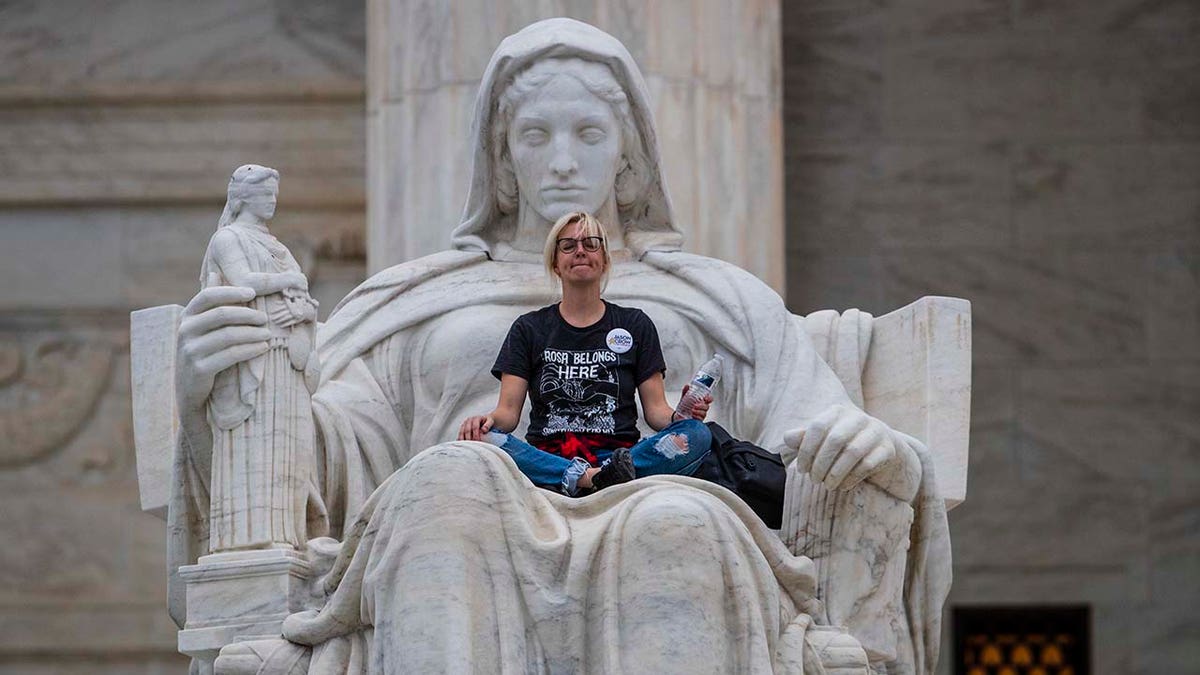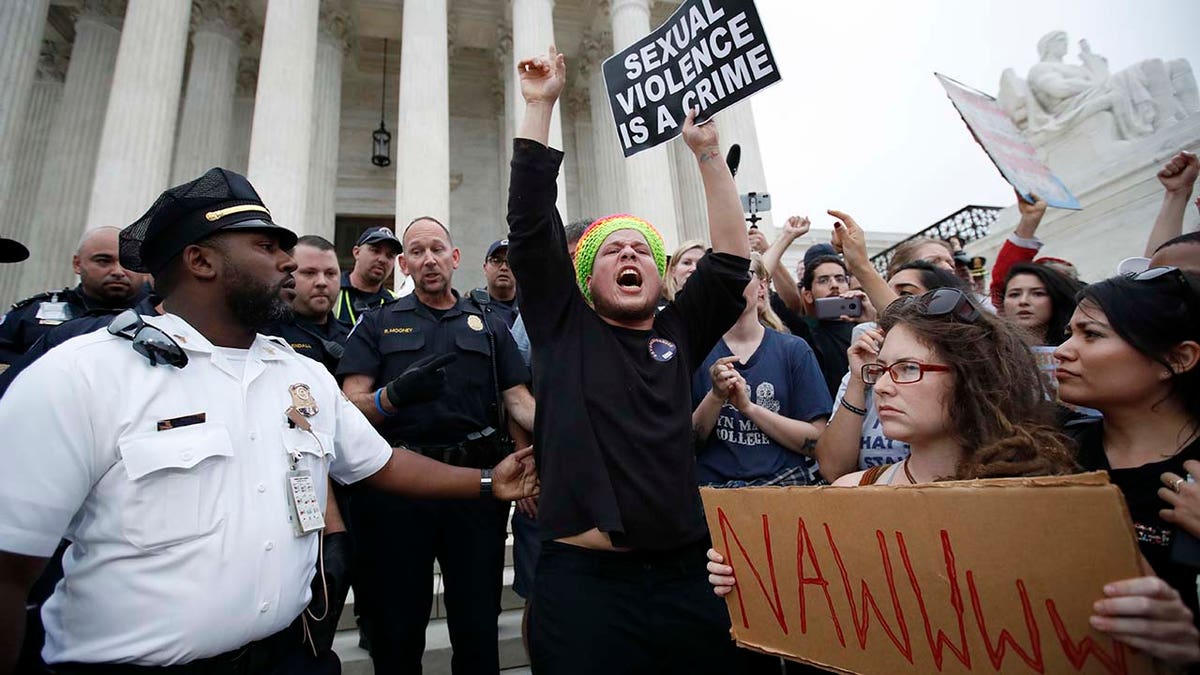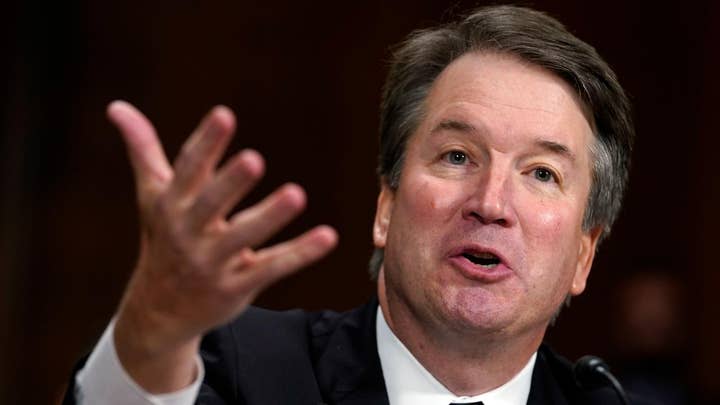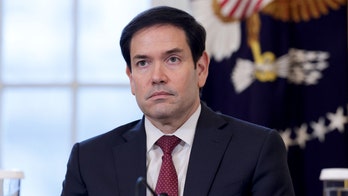
Jessica Campbell-Swanson, an activist from Denver, sits in the lap of a sculpture known as the Statue of Contemplation of Justice on the steps of the Supreme Court Building in Washington, D.C., where she and others protested the confirmation of Brett Kavanaugh as the high court's newest justice, Oct. 6, 2018.
Saturday's confirmation of Brett Kavanaugh to the U.S. Supreme Court sparked protests in several cities across the country, as Democrats and other opponents of President Trump's pick realized their efforts to derail his appointment to the nation's highest court had failed.
Outside the U.S. Capitol building in Washington, angry protesters broke through police barricades, waved banners and chanted “We believe survivors!” and “November is coming!” before the Senate voted almost entirely along party lines, 50-48, to confirm Kavanaugh, who was soon sworn in by Chief Justice John Roberts Jr. and retired Justice Anthony M. Kennedy.
Others shouted “Shame! Shame! Shame!” and “Arrest sexual predators!,” and some refused to leave the main rotunda of the Russell Senate Building.
Capitol Police said they cuffed at least 150 protesters and lined them up on the street with their hands bound behind their backs.
New York resident Barbara Sellars, 71, was resigned to the outcome of the Senate's vote on Kavanaugh, but said she felt it was still necessary to voice her displeasure, the New York Post reported.
“I have been marching for women’s rights and liberal causes for 50 years, and it’s sometimes a bit discouraging to be here,” Sellars said outside the Capitol. “But I don’t know what the alternative is. This is democracy. This is patriotism.”
"It’s sometimes a bit discouraging to be here. But I don’t know what the alternative is. This is democracy. This is patriotism.”

Police move activists as they protest on the steps of the Supreme Court after the confirmation vote of Supreme Court nominee Brett Kavanaugh, on Capitol Hill, in Washington, Oct. 6, 2018.
Not everyone outside the Capitol was anti-Kavanaugh.
Jim McCrown, 60, fended off nasty comments from protesters while sporting a “Reagan/Bush” T-shirt and speaking about his admiration for Kavanaugh.
“I like him because of his 12 years on the federal court," the Maryland resident said. “Never a peep or anything, not a whisper about him. Plus he believes in the Constitution. He’s a strict constitutionalist. That’s the reason. And I think he got a raw deal.”
President Trump's July nomination of Kavanaugh -- following Justice Kennedy's retirement announcement in June -- soon sparked a nationwide debate on whether Kavanaugh was too conservative to replace Kennedy, who had often been the court's "swing vote" -- sometimes siding with the court's conservatives and other times siding with its liberals.
But the debate became more heated after Kavanaugh was accused of sexual misconduct by Christine Blasey Ford and several other women -- and other people, male and female, from his past gave negative accounts of Kavanaugh's behavior from decades ago. Ford claimed Kavanaugh tried to rape her when they were in high school, but Kavanaugh strongly denied the claims.
President Trump celebrated his nominee's confirmation at a campaign rally in Topeka, Kan., while also taking aim at Democrats and Saturday’s protests.
“In their quest for power, the radical Democrats have turned into an angry mob,” Trump said. “You saw that today with the screaming and the shouting, not from the 200 people or less that were … You know what? Those people, they couldn’t fit in the front row. Look what we have here tonight.”
Earlier in the day, Senate Majority Leader Mitch McConnell also used the "mob" theme in describing those who opposed Kavanaugh's nomination.
"We stood up for the presumption of innocence, we refused to be intimidated by the mob of people coming after Republican members at their homes and hallways," McConnell said.
On Thursday, more than 300 demonstrators were arrested at Senate office buildings, and more protests followed Friday, leading up to Saturday's vote.
Saturday’s vote also didn’t deter people in Seattle from voicing their displeasure, the Seattle Times reported. Speakers at a rally there called for the survivors of sexual violence to receive more support and urged voters to participate in November's midterm elections.
An Ohio woman named Ashley, who said she was a rape survivor visiting Seattle, called the decisive vote for Kavanaugh by U.S. Sen. Susan Collins, R-Maine, “a gut punch because it was a woman.” She added that Collins “basically said we don’t believe women in this country when they tell the truth about being sexually assaulted.”

A protester holds a gavel with a slashed-out photo of Brett Kavanaugh in New York, Thursday, Oct. 4, 2018.
Others at the rally were registering people to vote in hopes of helping the Democrats take back the majority in Congress in November.
Other protests popped up in Boston, Chicago and Oakland, Calif.
In Denver, around 100 protesters rallied outside the offices of U.S. Sen. Cory Gardner, a Republican.
“Even though people have already made up their decision, we still feel it is our right to be heard,” Caroline Sheahan told Denver's FOX31.
Meanwhile, College Republicans at the University of Washington were planning a “Beers 4 Brett” event to celebrate the new Supreme Court justice. The event was originally planned to be held at a local bar, but management asked the group to take it somewhere else.
“We don’t do political events,” a manager said by phone Saturday afternoon.













































